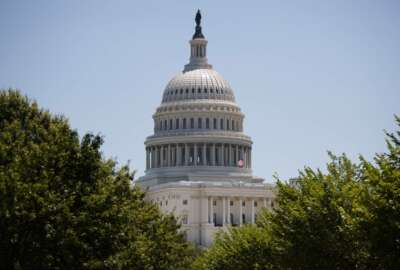
Senate passes budgets for DoD, HHS, Education, and Labor
In today's Federal Newscast, the Senate passed a bill funding the Defense Department until the end of September 2019, giving it a total of $675 billion for next...
To listen to the Federal Newscast on your phone or mobile device, subscribe on PodcastOne or Apple Podcasts. The best listening experience on desktop can be found using Chrome, Firefox or Safari.
- The Senate passed a bill funding the Defense Department until the end of September 2019. It gives DoD a total of $675 billion for 2019, as well as a 2.6 percent increase in pay for the military. A bill giving the Health and Human Services, Education and Labor Departments funding also cleared the Senate. It includes nearly $180 billion in funding for those agencies. (Federal News Radio)
- More than 30 military and veterans groups are pushing back against a reported move by the Trump administration to weaken financial protections for servicemembers. In a letter to Defense Secretary Jim Mattis and Mick Mulvaney, the director of the Consumer Financial Protection Bureau, the groups said it would be a mistake to weaken the Military Lending Act. The 2006 law capped interest rates for servicemembers. After that, DoD and CFPB used the law to crack down on predatory lenders surrounding military bases. The letter was prompted by reports that Mulvaney is considering doing away with some of the key measures the government has used to enforce those regulations. (Federal News Radio)
- Adding additional career paths for pilots in the Air Force will help reduce some of the current shortages, according to a new study from the RAND Corporation. The study states a warrant officer track or an aviation technical track would help fill the 2,000 empty pilot billets the Air Force has, but would require the development of new processes and polices. (RAND Corporation)
- Reality Winner, the former government contractor accused of leaking classified materials to the press, received five years in prison. Prosecutors said its the longest sentence ever imposed for a federal crime involving leaks to the media. The former Air Force translator had worked as a contractor at a National Security Agency office in Augusta, Georgia, when she gave a classified report to the Intercept. (Associated Press)
- A busy week for federal IT executives continues. The Department of Housing and Urban Development was the latest agency to join the CIO shuffle after it named David Chow as its new chief information officer. An agency spokesman confirmed Chow started Monday, coming over from the National Credit Union Administration. HUD became the third cabinet agency to see movement in their CIO role this week, joining the Department of the Interior and HHS. Chow served as a program manager at the NCUA since 2011. He replaced Johnson Joy, who resigned suddenly in March after only nine months on the job. Chad Cowan, the chief of staff to the deputy secretary, has been acting CIO since March.
- The Homeland Security Department will launch a “risk radar” next year aimed at helping agency leaders better understand their cybersecurity strategies. Mark Kneidinger, director of federal network resilience at DHS, said the radar would include data from its Continuous Diagnostics and Mitigation program, and agencies’ performance under the Federal Information Security Management Act or FISMA. Kneidinger said the risk radar will help bridge the cyber knowledge gap between agency heads and their chief information officers. (Federal News Radio)
- The Office of Management and Budget plans to set up its applied research center to tackle wide spread federal management problems in 2019. OMB said it will need a few million dollars of seed money to launch the Government Effectiveness Advanced Research or GEAR Center. The administration is currently seeking comments from industry, academia and think tanks on how it can set up and sustain the GEAR center to work on workforce, technology and similar management challenges.
- HHS moved on a recommendation from the Government Accountability Office. The Centers for Medicare and Medicaid Services got tough with states contemplating so-called demonstration projects. The projects are novel ways to serve Medicaid recipients as long as they don’t raise reimbursements the states receive from CMS. With Medicaid spending going through the roof, CMS sent state officials instructions for how to calculate so-called budget neutrality. It also sends them a standard form for doing so. (The Centers for Medicare and Medicaid Services)
- The federal excepted service has grown 10 percent over the last 20 years. The Office of Personnel Management said almost 30 percent of the federal workforce is made up of excepted service appointments. The remaining 70 percent are competitive hires. It admits agencies may have too many special hiring authorities to make appointments. Most use only about 11 out of the 62 available. OPM said agencies have more special hiring authorities to make excepted service appointments, but most hiring managers used about a dozen of them to make most of their hires. (Federal News Radio)
- President Donald Trump’s nominee to lead the White House Office of Science and Technology Policy promises to stay out of politics. Kelvin Droegemeier testified to the Senate Commerce, Science and Transportation Committee. Committee leadership wants to confirm Droegemeier quickly since OSTP has not had a director for nearly 600 days. (Senate Commerce, Science, and Transportation Committee)
Copyright © 2024 Federal News Network. All rights reserved. This website is not intended for users located within the European Economic Area.
Eric White
Eric White is news anchor and Federal Drive producer at Federal News Network.
Follow @FEDERALNEWSCAST
Related Stories
Related Topics
Air Force
All News
Budget
Centers for Medicare and Medicaid Services
CIO News
Congress
Defense
Defense News
Department of Health and Human Services
Department of Homeland Security
Department of Housing and Urban Development
Education Department
Federal Drive
federal excepted service
Federal Newscast
federal spending
Labor Department
Management
Office of Personnel Management
Office of Science and Technology Policy
People
Reality Winner
Senate
Technology
Veterans Affairs
Workforce





